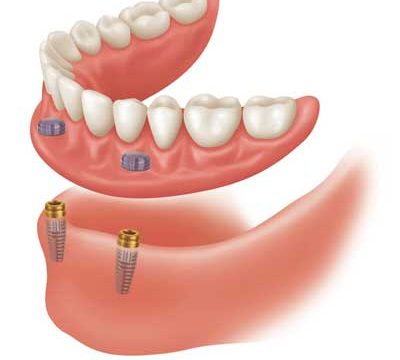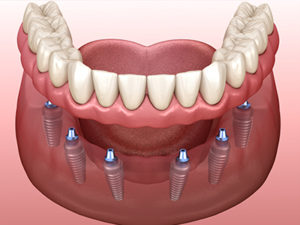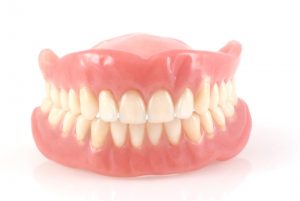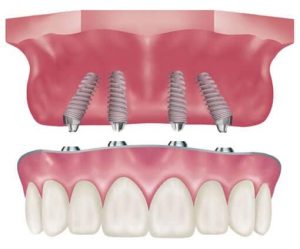
Tooth loss can be a difficult experience for many people, and it can have a significant impact on one’s confidence and quality of life.
Fortunately, there are several options for replacing missing teeth, including dentures vs implants. However, choosing the right option can be overwhelming, especially when considering the cost, maintenance requirements, and potential complications associated with each option.
In this article, we will explore the pros and cons of dentures vs implants, compare the two options, and help you make an informed decision about which option is right for you.
Different Types of Dentures and Their Pros and Cons
Dentures are removable dental appliances that are used to replace missing teeth. There are two types of dentures: partial and complete. Partial dentures are used when some natural teeth remain, while complete dentures are used when all natural teeth are missing. Dentures are typically made of acrylic, and they are custom-fitted to the patient’s mouth to ensure a comfortable fit.
Pros: One of the main advantages of dentures is their affordability. Dentures are generally less expensive than dental implants, making them a more accessible option for many people. Additionally, dentures can be fabricated relatively quickly, allowing patients to have their new teeth in just a few appointments. They are also non-invasive and do not require any surgical procedures, making them a suitable option for patients who may not be suitable candidates for dental implants.
Cons: One of the main disadvantages of dentures is their durability. While they can last for several years with proper care, dentures tend to wear out and require replacement more frequently than dental implants. Dentures can also be uncomfortable and may require frequent adjustments to ensure a proper fit. Additionally, dentures can affect speech and eating habits, particularly during the initial adjustment period.
Cost Considerations: The cost of dentures varies depending on the type of denture and the materials used. Partial dentures can cost between $300 to $4,000 per arch, while complete dentures can cost between $500 to $5,000 per arch. Dental insurance may cover some or all of the cost of dentures, depending on the policy.
Understanding Dental Implants: What They Are and How They Work
Dental implants are a more permanent solution for missing teeth. They involve the surgical placement of a titanium post into the jawbone, which serves as a replacement for the missing tooth root. For individuals seeking dental implants in Rockville, this procedure offers a reliable and natural-looking way to restore both functionality and appearance. Once the implant is securely anchored into the jawbone, a custom-made crown is attached to the top of the post, creating a natural-looking replacement tooth.
Pros: One of the main advantages of dental implants is their durability. With proper care, dental implants can last a lifetime, making them a long-term investment. Dental implants are also designed to look, feel, and function like natural teeth, allowing patients to eat, speak, and smile with confidence. Additionally, dental implants help to maintain jawbone density, which can prevent further tooth loss and improve overall oral health.
Cons: One of the main disadvantages of dental implants is their cost. Dental implants are typically more expensive than dentures, and the cost can vary depending on several factors, including the number of implants needed, the complexity of the procedure, and the materials used. Additionally, dental implant surgery is an invasive procedure that requires several appointments and a lengthy healing period. Some patients may experience complications, such as infection or implant failure, which can require additional treatment.
Cost Considerations: The cost of dental implants varies depending on several factors, including the number of implants needed, the complexity of the procedure, and the materials used. A single dental implant can cost between $3,000 to $6,000, while a full set of implants can cost upwards of $50,000. Dental insurance may cover some or all of the cost of dental implants, depending on
Dentures: Getting Fitted and Adjusting to Life with Them
Dentures are removable appliances that are designed to replace missing teeth and restore oral functionality. If you’re considering dentures as a tooth replacement option, you’ll need to go through a fitting process to ensure that your dentures fit comfortably and securely in your mouth.
The fitting process typically involves several steps, starting with an evaluation of your oral health and a discussion of your tooth replacement options with your dentist. Your dentist will take impressions of your mouth and create a custom set of dentures that are tailored to your specific needs and preferences.
Once your dentures have been created, your dentist will fit them into your mouth and make any necessary adjustments to ensure a proper fit. It’s normal for dentures to feel uncomfortable or loose at first, as your mouth will need some time to adjust to the new appliances. Your dentist may recommend using a denture adhesive to help keep your dentures in place and improve their stability.
It’s important to follow your dentist’s instructions for wearing and caring for your dentures to ensure that they last as long as possible and maintain their shape and appearance. You’ll need to remove your dentures at night and soak them in a denture cleaning solution to remove any bacteria or debris that may have accumulated throughout the day. You should also brush your dentures daily using a soft-bristled brush and mild soap or denture cleaner.
Dental Implants: The Surgery and Recovery Process
Dental implants are a more permanent and durable tooth replacement option than dentures. They involve surgically placing a small post into the jawbone, which serves as a foundation for a custom-made artificial tooth.
Before getting dental implants, your dentist will evaluate your oral health and create a personalized treatment plan for you. You’ll need to undergo a surgical procedure to have the implant post placed into your jawbone. This procedure can take several hours, depending on the number of implants you need.
After the surgery, you’ll need to allow time for the implant to fuse with the surrounding tissue and bone. This process, called osseointegration, typically takes several months to complete. Your dentist may provide you with a temporary tooth replacement option, such as a temporary bridge or denture, while your implant heals.
Once your implant has fully healed, your dentist will attach a custom-made artificial tooth to the implant post. This tooth will be designed to match your natural teeth in shape, size, and color, and will be secured in place using a special dental adhesive.
It’s important to take special care of your implant site during the healing process to prevent complications such as infection or implant failure. You’ll need to follow your dentist’s instructions for oral care and avoid certain foods and activities that could damage the implant.
Dentures vs. Implants: Comparing the Pros and Cons
Both dentures vs dental implants have their advantages and disadvantages, and the best option for you will depend on your individual needs and preferences. Here are some key factors to consider when choosing between dentures vs implants:
Cost: Dentures are typically more affordable than dental implants, which can require multiple procedures and appointments to complete.
Comfort: While dentures may take some time to adjust to, they are generally more comfortable than dental implants, which require surgery and a healing period.
Appearance: Dental implants offer a more natural-looking result than dentures, which may appear bulky or artificial.
Durability: Dental implants are more durable than dentures and can last for many years or even a lifetime with proper care and maintenance.
Long-term oral health outcomes: Dental implants help to preserve the health and structure of the jawbone, which can deteriorate over time without natural teeth or tooth replacements. Dentures, on the other hand, do not offer the same level of support for the jawbone and may contribute to bone loss over time.
Maintenance: Dentures require daily cleaning and periodic adjustments, while dental implants can be treated like natural teeth and only require regular brushing and flossing.
Overall, the decision between dentures vs implants will depend on your individual needs and preferences, as well as your budget and long-term goals for your oral health. It’s important to discuss your options with your dentist and ask any questions you may have before making a decision.
Regardless of which option you choose, it’s important to prioritize good oral hygiene and regular dental check-ups to maintain the health of your natural teeth and tooth replacements. Your dentist can provide guidance on the best practices for oral care and help you maintain a healthy, functional smile for years to come.
Making an Informed Decision: Factors to Consider when Choosing between Dentures and Dental Implants
In conclusion, dentures vs dental implants are both viable options for replacing missing teeth and restoring oral functionality. While dentures are a more affordable and comfortable option, dental implants offer a more natural-looking and durable result, with long-term benefits for oral health.
Ultimately, the best choice will depend on your individual needs and preferences, as well as your budget and long-term goals for your oral health. Consulting with your dentist is key in making an informed decision and maintaining good oral health.
Please select service, date and provider then click on the Find Appointments button.



